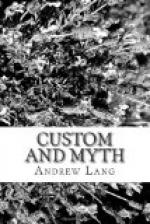(5.) On the evidence from myth and legend we propose to lay little stress. But, as legends were not invented by anthropologists to prove a point, it is odd that the traditions of Athens, as preserved by Varro, speak of a time when names were derived from the mother, and when promiscuity prevailed. Marriage itself was instituted by Cecrops, the serpent, just as the lizard, in Australia, is credited with this useful invention. {273a} Similar legends among non-Aryan races, Chinese and Egyptian, are very common.
(6.) There remains the evidence of actual fact and custom among Aryan peoples. The Lycians, according to Herodotus, ’have this peculiar custom, wherein they resemble no other men, they derive their names from their mothers, and not from their fathers, and through mothers reckon their kin.’ Status also was derived through the mothers. {273b} The old writer’s opinion that the custom (so common in Australia, America, and Africa) was unique, is itself a proof of his good faith. Bachofen (p. 390) remarks that several Lycian inscriptions give the names of mothers only. Polybius attributes (assigning a fantastic reason) the same custom of counting kin through mothers to the Locrians. {273c} The British and Irish custom of deriving descents through women is well known, {273d} and a story is told to account for the practice. The pedigrees of the British kings show that most did not succeed to their fathers, and the various records of early Celtic morals go to prove that no other system of kinship than the maternal would have possessed any value, so uncertain was fatherhood. These are but hints of the prevalence of institutions which survived among Teutonic races in the importance attached to the relationship of a man’s sister’s son. Though no longer his legal heir, the sister’s son was almost closer than any other kinsman.
We have now summarised and indicated the nature of the evidence which, on the whole, inclines us to the belief of Mr. M’Lennan rather than of Sir Henry Maine. The point to which all the testimony adduced converges, the explanation which most readily solves all the difficulties, is the explanation of Mr. M’Lennan. The Aryan races have very generally passed through the stage of scarcity of women, polyandry, absence of recognised male kinship, and recognition of kinship through women. What Sir Henry Maine admits as the exception, we are inclined to regard as having, in a very remote past, been the rule. No one kind of evidence—neither traces of marriage by capture, of exogamy, of totemism, of tradition, of noted fact among Lycians and Picts and Irish—would alone suffice to guide our opinion in this direction. But the cumulative force of the testimony strikes us as not inconsiderable, and it must be remembered that the testimony has not yet been assiduously collected.




